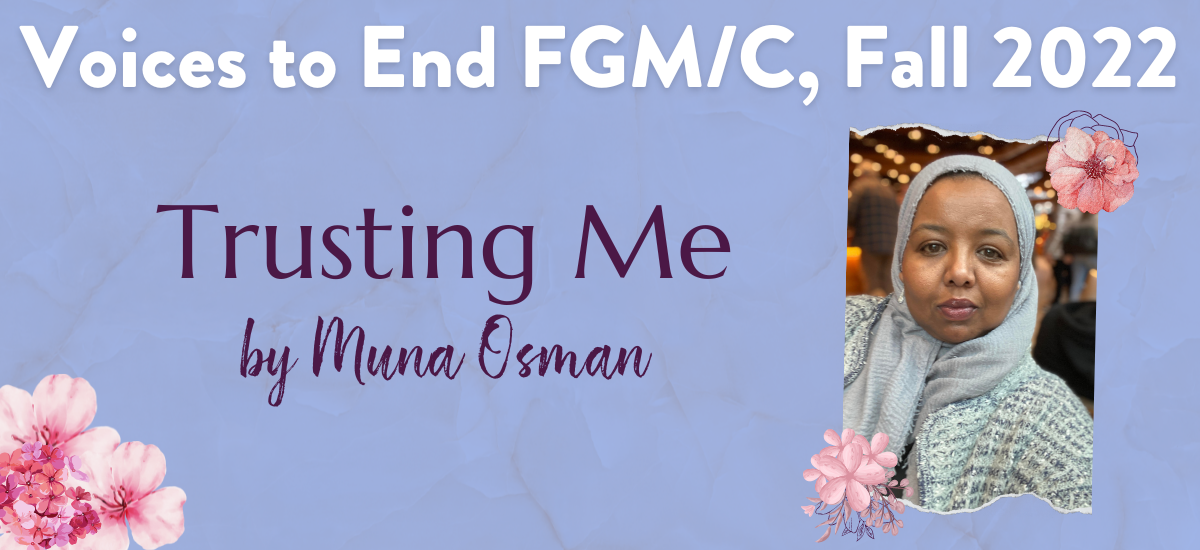
Trusting Me
By Muna Osman
Why did you want to attend the workshop and share your story?
I first found out about the Voices workshop when I met with Mariya. The meeting was in a different setting; I had no idea about the workshop before she told me about what Sahiyo does with these stories. After that meeting, I went back and looked at the videos and something struck a chord in me. The experience had always been in the back of my mind, but interestingly, I never actually sat down and thought of those moments. Maybe I didn’t have the courage, or maybe I just didn’t want to be the first to put myself out there. It’s a very taboo topic, and I didn’t know what doors I would open by talking about my experience.
When I was exposed to Voices, I began contemplating sharing my story. When I talked to my husband about it, he asked me what I would add to the story. He said, you already know what happened to you. What will you add in the story? I said, no I don’t know what happened to me. At that moment, I started crying, realizing that for fifty years I had not spoken about this to anyone. That’s when I decided that I had to share my story for myself; I had to acknowledge that this had happened to me.
What story did you choose to tell and create into a digital story?
So because I had never spoken about this experience before, I didn’t know where to start. There was so much I had to say, but it was all coming at me from multiple directions. There was one thing that struck me most while remembering my story– my mother’s face. I was screaming and crying for help, and my mother’s face was cold and unflinching. She ignored my cries for help. I can see her face right now.
That really has had an impact on who I am today. It is because of that memory that I cannot fully trust others; I never give anyone 100% access to me. After I made that connection, I decided that I wanted to tell my digital story using the voice of my younger self, a kid with no power.
What have you learned or most enjoyed during the workshop and by meeting others who shared their stories?
I most enjoyed just that– meeting others who vocalized their stories and shared their experiences. Their stories normalized my own; their feelings validated mine. In the beginning, listening to others’ stories was very hard. At the end of each session, they kept saying: take care of yourself. But I felt like the session was taking care of me. I opened up. I started talking and writing about this experience, and started recording myself.
As a nurse practitioner, it’s part of my job to talk about FGM. I’ve always been an advocate against it. I’ve talked about the short-term and long-term side effects, and the consequences survivors can live with. But as a professional, I feel a distance as I speak about this; I’m standing there talking to people about this practice and what they should and shouldn’t do, and I have a wall put up in front of me.
What kind of impact would you like your story to have?
I want every woman who lives in a community that practices this (because I know they do it in good faith, it’s a culture) to see the perspective of that child that they are overpowering and hurting. I want them to feel the pain, and hear the child who is going to go through such immense pain.
Is there anything in your digital story that you would like to share?
Yes! I want to mention the artist who made the sketches for me. She took my story, listened to it, and illustrated it in a respectful way. She took my voice and what she knows about me and created such a detailed portrayal of my story. When I saw it, I was shook. It was like a flashback. The fan I talked about, the walls, the thing they put in my mouth (I think it was a sock), the rope they tied my legs with, the colors of the culture! She illustrated everything in a way that brought me back to that room. I really appreciate her work, and so I wanted to call her out. She’s a hidden artist, you know, she does it for fun. She paid so much attention to detail and it means so much to me. She’s really talented; she’s a hero and she came through for me.
Dr. Muna Osman is a Doctorate Prepared Nurse Practitioner, and Board Certified Family medicine. Have accumulated professional experience as nurse 16 years and as Nurse Practitioner 5 years. She is the founder of Holistic Family Care & Aesthetics; also a Co-founder of Mama Amaan (Safe motherhood) Health Research group. She is a co founder if Washington coalition to end FGM/C. She is fluent in Arabic, Somali, and English. Her professional and research work focuses on innovative health care services and Health equity for refugee women healthcare and antenatal care.
Disclaimer
This blog was produced by Sahiyo under 15POVC-21-GG-00988-NONF, awarded by the Office for Victims of Crime, Office of Justice Programs, U.S. Department of Justice. The opinions, findings, and conclusions or recommendations expressed in this guide are those of the contributors and do not necessarily represent the official position or policies of the U.S. Department of Justice.